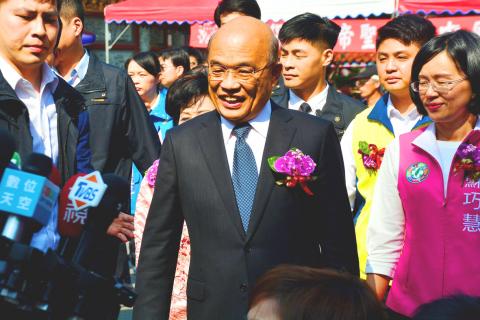Beijing has been manipulating public opinion to advance its expansionist ambitions in Taiwan, Premier Su Tseng-chang (蘇貞昌) said yesterday, calling on the public not to become unwitting tools of Chinese propaganda as an apparent Beijing-directed social media influence campaign causes concern.
The Mainland Affairs Council in a statement on Friday said it had asked the government to investigate whether China’s reported effort to recruit pro-China content creators in Taiwan contravenes Taiwanese laws.
The council’s statement was perceived to be a response to reports that job advertisements have appeared on Facebook that seek Taiwanese applicants willing to promote a Taiwanese detente or unification with China.

Photo: CNA
“The Internet is as much a weapon of the Chinese government as the Chinese warships and fighter jets circling the nation,” Su said yesterday.
“China is paying people from all classes of Taiwanese society and utilizing the Internet to manufacture disinformation and fake news, which create divisions and demoralization that aid Beijing’s ambitions of annexing Taiwan,” he said.
While government agencies have been ordered to take precautions against China’s influence operations, members of the public are called upon to exercise their best judgement when consuming information, he said.
The Legislative Yuan’s Organic Laws and Statutes Bureau has raised concerns that a bill being drafted by the Executive Yuan to regulate false reporting could infringe on freedom of the press, he said.
“We hope the media can regulate itself, but we have witnessed disconcerting developments, which the public has also condemned,” he said. “Both self-regulation and laws are needed for effective regulation.”
The Executive Yuan is mulling another amendment to the Criminal Code that would punish people who help spread false information, Cabinet spokeswoman Kolas Yotaka said yesterday.
“We cannot let outside forces take advantage of Taiwan’s freedom while harming our democracy,” Kolas said, adding that the government would continue to combat false reporting aimed at causing social unrest.
Separately yesterday, Taoyuan City Councilor Wang Hao-yu (王浩宇) of the Green Party said that a business entity had offered him a seven-digit sum to sell a Facebook community page for Jhongli District (中壢) that he administers.
The entity is apparently based in China and its offer is probably connected to the general elections next year, he said, adding that the business seemed to have calculated the asking price based on the number of posts and comments generated.
“I am not a sellout and I will not allow our priceless freedom of speech to fall into the hands of the information warfare operatives across the [Taiwan] Strait,” he said.
The National Security Bureau has been asked to launch an investigation into the identity of the would be buyer, he said.
Additional reporting by CNA

A Taiwanese software developer has created a generative artificial intelligence (AI) model to help people use AI without exposing sensitive data, project head Huang Chung-hsiao (黃崇校) said yesterday. Huang, a 55-year-old coder leading a US-based team, said that concerns over data privacy and security in popular generative AIs such as ChatGPT and DeepSeek motivated him to develop a personal AI assistant named “Mei.” One of the biggest security flaws with cloud-based algorithms is that users are required to hand over personal information to access the service, giving developers the opportunity to mine user data, he said. For this reason, many government agencies and

The National Fire Agency on Thursday said a series of drills simulating a magnitude 8.5 earthquake would be held in September to enhance the government’s emergency response capabilities. Since earthquakes cannot be predicted, only by continuously promoting disaster prevention measures could Taiwan enhance its resilience to earthquakes, agency Director-General Hsiao Huan-chang (蕭煥章) said in a news release. The exercises would be held to mark annual National Disaster Prevention Day on Sept. 21, the aim of which is to test Taiwan’s preparedness and improve its earthquake resilience in case of a major temblor, Hsiao said. As part of those drills, an earthquake alert would

DEFENSE: The National Security Bureau promised to expand communication and intelligence cooperation with global partners and enhance its strategic analytical skills China has not only increased military exercises and “gray zone” tactics against Taiwan this year, but also continues to recruit military personnel for espionage, the National Security Bureau (NSB) said yesterday in a report to the Legislative Yuan. The bureau submitted the report ahead of NSB Director-General Tsai Ming-yen’s (蔡明彥) appearance before the Foreign and National Defense Committee today. Last year, the Chinese People’s Liberation Army (PLA) conducted “Joint Sword-2024A and B” military exercises targeting Taiwan and carried out 40 combat readiness patrols, the bureau said. In addition, Chinese military aircraft entered Taiwan’s airspace 3,070 times last year, up about

STRICTER ENFORCEMENT: Taipei authorities warned against drunk cycling after a sharp rise in riding under the influence, urging greater public awareness of its illegality Taipei authorities have issued a public warning urging people not to ride bicycles after consuming alcohol, following a sharp rise in riding under the influence (DUI) cases involving bicycles. Five hundred and seven people were charged with DUI last year while riding YouBikes, personal bicycles, or other self-propelled two-wheelers — a fourfold increase from the previous year, data released by the Taipei Police Department’s Traffic Division showed. Of these, 33 cases were considered severe enough to be prosecuted under “offenses against public safety,” the data showed. Under the Road Traffic Management and Penalty Act (道路交通管理處罰條例), bicycles — including YouBikes and other